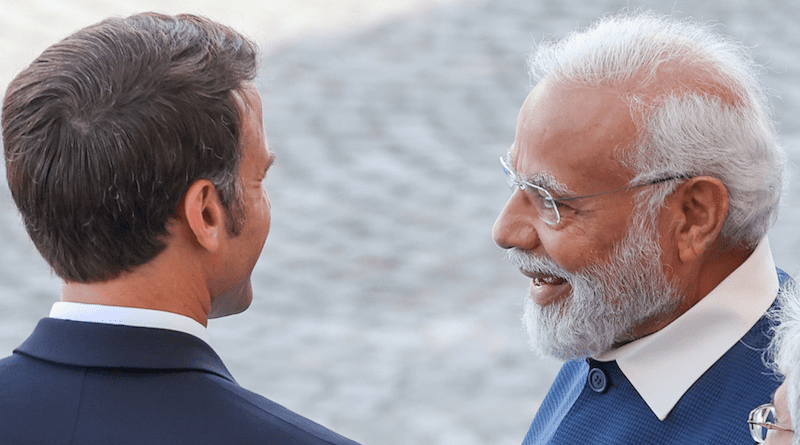France Touts Indian Strategic Partnership, Seals New Defense Deals During Modi Visit
By EurActiv
By Alexandra Brzozowski
(EurActiv) — India announced a new multi-billion-dollar deal for French fighter jets on Thursday (13 July) as Prime Minister Narendra Modi visited Paris for a two-day trip in a sign of deepening trade and diplomatic ties to counter a rising China.
Modi’s visit this week as a guest of honour during France’s national day celebrations comes as the two countries celebrate the 25th anniversary of their Indo-French strategic partnership, and they are set to present a roadmap for the next 25 years of bilateral cooperation.
Modi has visited France four times since French President Emmanuel Macron came to power in 2017, while Macron was honoured with a state visit to New Delhi in 2018.
Governmental aides on both sides have pointed to positive relations and cooperation on climate change, space technology and nuclear power during their partnership.
Bilateral trade had doubled in the last nine years, and Macron’s “thinking really matches ours”, Modi told French newspaper Les Echos before the visit.
India and France “are naturally compatible,” and “we see France as one of our foremost global partners,” Modi said.
“This closeness is not limited to just the leaders of two countries, it is, in fact, a reflection of the unwavering friendship between India and France,” Modi told an enthusiastic crowd of Indians living in France on Thursday evening.
The visit also comes weeks after Modi was given the rare honour of a White House state dinner in Washington, a county he was once banned from visiting.
Strategic Partnership
The Indian government confirmed on Thursday it will buy 26 Rafale Marine fighter jets and 3 Scorpene-class military submarines from France’s Dassault and Naval Group, with the price and other terms still being worked out.
New Delhi is one of the biggest buyers of French arms, and in 2015, Modi announced a deal for 36 Rafale fighter jets worth €4 billion at the time.
On Friday, Paris and New Delhi are expected to announce new cooperation and investment projects in the transport, energy and space sectors, according to an Elysée source, without providing details on what companies would be involved.
France’s rail company Alstom has previously sold trains to public transport networks in India, while French energy giant EDF has been negotiating the sale of six nuclear reactors to India for years.
The visit and the fresh defence deals come as Paris intensifies political and commercial ties with India while bidding to draw the Asian powerhouse away from Russia, its top weapons supplier.
New Delhi, which has long sought to balance its ties with Moscow and the West, has so far shied away from condemning Russian President Vladimir Putin’s invasion of Ukraine and has emerged as a top buyer of discounted Russian oil.
“A key goal for India has been to diversify its defence procurements to reduce reliance on Russia, and France has been the most important partner in that,” Garima Mohan, Senior Fellow in the Indo-Pacific Program of the German Marshall Fund (GMFUS), told EURACTIV.
France, in turn, “has also invested a lot of political will and time in the India relationship, much more so than its European counterparts,” she added.
Despite differences over the war in Ukraine and tensions over human rights in India, Western democracies are courting Modi and India as a counterweight to China in Asia.
“India is central to the French Indo-Pacific strategy and on questions of security, particularly maritime security in the Indian Ocean, combatting climate change, and providing sustainable infrastructure – India is a key Indo-Pacific partner for France,” Mohan said.
France, for a long time, has been one of the few EU member states with significant naval forces in the region, but the rest of the EU has come under heightened pressure to step up after US President Joe Biden marked China as a leading global security threat.
Over the past years, the EU has ramped up its strategy for raising its presence in the Indo-Pacific and countering China’s increasing influence in the region.
“New Delhi and Paris also agree on their assessment of threats from China, particularly in the maritime domain,” Mohan said.
“Overall, President Macron’s recent trip to Beijing did raise some concerns in New Delhi, but there is deep political trust and enough convergence on China-related challenges between India and Paris that this did not cause any major issues,” she told EURACTIV.
Human rights
Few observers, however, expect Macron to raise human rights concerns with Modi, although not publicly.
On the eve of the visit, a resolution from the European Parliament on Thursday (10 July) served as a reminder of Modi’s controversial leadership style and Hindu nationalist agenda criticised at home and abroad.
The resolution urged New Delhi to end violence in the country’s restive northeastern Manipur state and to protect minorities there.
Clashes between the majority Meitei, mostly Hindus, and the mainly Christian Kuki tribe have left at least 120 people dead, 50,000 displaced, and over 1,700 houses destroyed, the parliament said.
It criticised the “nationalistic rhetoric” of the local state government, run by Modi’s Bharatiya Janata Party (BJP).
Since his first crushing electoral victory in 2014, he has also been denounced by rights groups for increased discrimination and violence towards the country’s Muslims, as well as stifling independent media.
During Bastille Day in France, Modi’s role was “an affront not only to India’s minority communities, journalists and human rights defenders but also to India as a democracy,” the text’s chief negotiator, Pierre Larrouturou, said.
However, A protest against Modi drew only a few dozen people in central Paris on Thursday, according to French media.

